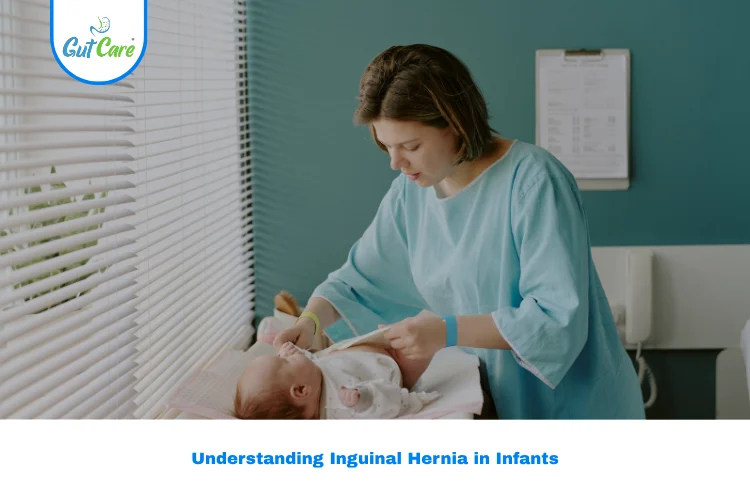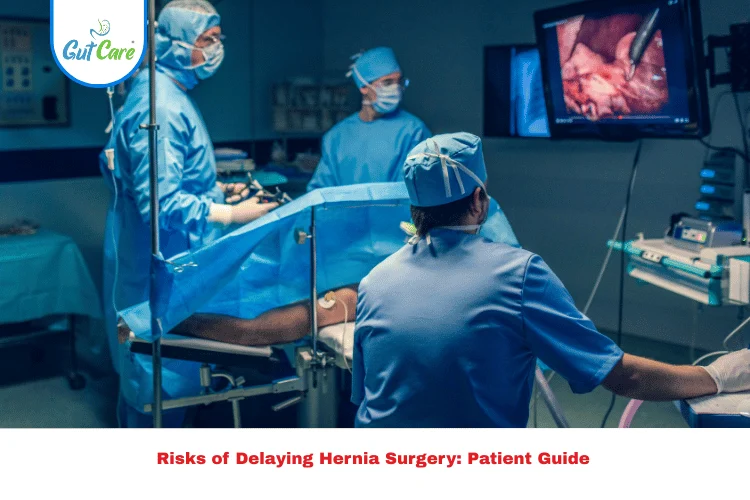Inguinal Hernia in Infants is a common condition where a part of the intestine pushes through a weak spot in the lower abdominal wall or groin area. It often appears as a small bulge, especially noticeable when the baby cries, coughs, or strains. Early detection is important to prevent any complications. Common causes include a natural weakness in the abdominal wall or incomplete closure during development. Timely medical evaluation ensures safe and effective care. At Gutcare Clinics, Bangalore, Dr. Yuvrajsingh Gehlot, an experienced colorectal surgeon, provides expert assessment and treatment for infants with hernia conditions. Understanding inguinal hernia meaning, causes, and treatment helps parents make informed decisions for their child’s health.
Inguinal Hernia Meaning
An inguinal hernia occurs when a part of the intestine or abdominal tissue pushes through a weak area in the lower abdominal wall, near the groin region. This condition often appears as a small bulge that becomes more visible while standing, coughing, or lifting objects. It is one of the most common types of hernias. Causes may include heavy lifting, chronic coughing, or a natural weakness in the abdominal muscles.
Symptoms may include mild discomfort, pain in the groin, or a visible lump that reduces when lying down. Early diagnosis helps prevent complications and ensures effective management. At Gutcare Clinics, Dr. Yuvrajsingh Gehlot, an experienced colorectal surgeon in Bangalore, provides advanced and safe treatment options for inguinal hernia to ensure long-term relief.
Common Inguinal Hernia Causes in Infants
There are several causes of Inguinal Hernia in Infants, and understanding them can help parents act early. Some of the most common include:
- Incomplete closure of the inguinal canal: A natural passage in the lower abdomen that sometimes remains open after birth.
- Premature birth: Premature babies have weaker abdominal walls.
- Family history: Genetic factors can make infants more prone to hernias.
- Strain during crying or bowel movements: Repeated pressure increases hernia risk.
Proper understanding of these causes helps parents recognize when to seek medical attention.
Inguinal Hernia Symptoms in Infants
Recognizing Inguinal Hernia in Infants symptoms early is essential. The following are common indicators parents should look for:
- A soft bulge or swelling in the groin or scrotum area, noticeable when the baby cries or strains.
- Discomfort or irritability, especially during feeding or crying.
- Swelling that comes and goes, depending on body position.
- In severe cases, the bulge may become firm or painful, signaling a possible trapped intestine—an emergency requiring immediate care.
If you observe these symptoms, consult a colorectal surgeon promptly to avoid complications.
Types of Inguinal Hernia in Infants
There are two main forms of Inguinal Hernia in Infants:
- Indirect Inguinal Hernia: The most common type in babies. It happens when the inguinal canal doesn’t close properly, allowing abdominal contents to move into the groin.
- Direct Inguinal Hernia: Less common in infants, this occurs when abdominal wall weakness causes tissue to push directly through the muscle.
Understanding Inguinal Hernia in Infants helps parents grasp the diagnosis and discuss appropriate treatment options with their doctor.
Inguinal Hernia Treatment for Infants
When it comes to Inguinal Hernia in Infants treatment, the approach depends on the child’s age and the severity of the condition.
At Gutcare Clinics, Bangalore, Dr. Yuvrajsingh Gehlot offers specialized evaluation and treatment options, ensuring safe and effective care.
Common treatment methods include:
- Observation: For mild cases, close monitoring may be recommended.
- Surgical Repair: In most cases, surgery is needed to close the hernia opening and prevent recurrence.
- Minimally Invasive Procedures: Modern laser-assisted techniques provide faster healing and minimal discomfort.
With proper care and follow-up, most infants recover quickly and resume normal activities within days.
Diet and Care Tips After Inguinal Hernia Treatment
Although Inguinal Hernia in Infants primarily requires medical or surgical intervention, proper diet and care can support faster healing:
- Breastfeeding or balanced formula feeding ensures good nutrition.
- Avoid tight diapers or clothing to reduce pressure in the groin.
- Follow doctor’s post-surgery instructions strictly.
- Regular check-ups with your colorectal surgeon help monitor recovery.
These care tips can make the recovery process smoother and more comfortable for your baby.
Why Early Diagnosis Matters
Early identification of Inguinal Hernia in Infants is crucial to prevent complications, including trapping of the intestine. Parents should watch for small bulges near the groin, especially when the baby cries or strains. Timely consultation with specialists, such as Dr. Yuvrajsingh Gehlot at Gutcare Clinics, Bangalore, ensures accurate diagnosis. Proper evaluation allows for safe and effective treatment tailored to your child’s needs. Early medical care supports better recovery and long-term health.
Conclusion
Inguinal Hernia in Infants is a manageable condition when detected early and treated properly. Parents should watch for symptoms like groin swelling, irritability, or discomfort and seek medical help immediately.
At Gutcare Clinics, Bangalore, expert evaluation and care by Dr. Yuvrajsingh Gehlot provide reassurance, safe procedures, and long-term comfort for your child.
FAQs
1. What is the main cause of Inguinal Hernia in Infants?
The primary cause is an opening in the abdominal wall that doesn’t close properly before birth, allowing the intestine to push through.
2. What are common Inguinal Hernia symptoms in babies?
A noticeable groin swelling, discomfort during crying, or a bulge that becomes visible while straining are typical inguinal hernia symptoms.
3. Is surgery necessary for Inguinal Hernia in Infants?
Yes, in most cases, surgical repair is the safest and most effective inguinal hernia treatment for preventing recurrence or complications.
4. Can an Inguinal Hernia heal naturally without treatment?
No. Unlike other minor conditions, hernias don’t heal on their own. Consultation with a colorectal surgeon is necessary for proper care.
5. Where can I find expert Inguinal Hernia treatment in Bangalore?
Gutcare Clinics, Bangalore, led by Dr. Yuvrajsingh Gehlot, offers specialized diagnosis and inguinal hernia treatment for infants with advanced care options.




